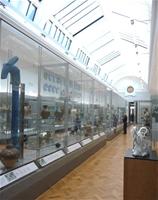2 years later
Adelina Marini, March 1, 2010
 Even two years ago the Centre for European Reform chief economist Simon Tilford warned that the economic imbalances in the eurozone could prove to be dangerous. Then his major warning was about the danger of large current account deficits in the PIGS countries - Portugal, Ireland, Greece and Spain. Now that it is already clear that the warnings were not taken into account, Simon Tilford is again analyzing the situation.
Even two years ago the Centre for European Reform chief economist Simon Tilford warned that the economic imbalances in the eurozone could prove to be dangerous. Then his major warning was about the danger of large current account deficits in the PIGS countries - Portugal, Ireland, Greece and Spain. Now that it is already clear that the warnings were not taken into account, Simon Tilford is again analyzing the situation.
The main problem, according to him, is that many eurozone governments do not seem to have understood the implications of membership. When they signed up to the euro they effectively committed themselves to liberal economic policies. There is no eurozone government to transfer funds from stronger to weaker member-states. So if a country loses competitiveness, Mr Tilford writes, it has no option but to cut its costs relative to the rest of the currency bloc. The best way of doing this is through higher productivity - in other words to produce higher quality at a lower prime cost and therefore end-price.
However the problem is, the author says, that the countries from the Southern periphery were not in a rush to improve their dire productivity. This is why, what's left for them to do, was to cut salaries. They did not do this either, thus leaving their heavily regulated labour markets unreformed.
All the same the economist does not put all the blame to the Southern states. He says that another factor for the dire imbalance of the eurozone is Germany, which is often cited as the country which understands how to flourish within a currency union. Germany has certainly shown discipline. Berlin resisted numerous times the pressure to increase wages, thus keeping its export competitiveness. But Germany's strategy is hardly one that other countries can follow, because one country's surplus is another's deficit.
After all neither the Germans, nor the other countries with enormous surpluses do nothing to  rebalance their economies, Simon Tilford writes. In order to retain the confidence of lenders the eurozone's hard-hit governments will make big cuts in public spending. And to the very frequently asked question lately whether all these problems mean an end of the eurozone, Simon Tilford replies with determination: "No, but the future certainly looks decidedly troubled".
rebalance their economies, Simon Tilford writes. In order to retain the confidence of lenders the eurozone's hard-hit governments will make big cuts in public spending. And to the very frequently asked question lately whether all these problems mean an end of the eurozone, Simon Tilford replies with determination: "No, but the future certainly looks decidedly troubled".
A little more detailed analysis of the situation, especially in Germany, offers Jack Ewing in the New York Times. He is trying to explain why Germany is so export-oriented by telling the story of a small glass factory. The company is founded in 1836 and produces glass display-cases with special cooling and special covers where precious historic objects are being preserved. For example, the mummy of King Tutankhamen in Luxor is being held in a display-case, produced by Glassbau Hahn.
60 percent of its sales are abroad and the factory is dominating its narrow but lucrative niche: the global market for museum display-cases. This is one of thousands of other small German exporters whose success, according to Jack Ewing, is at the expense of the PIGS countries (Portugal, Ireland, Greece, Spain). Why? Because these countries, also known as peripheral nations, have incurred crushing debts in part because they bought too many Mercedes cars and other imports from Germany and elsewhere, without producing enough of their own export goods. In fact, goods from Greece, Spain and Portugal were often no longer competitive because in the last decade those countries had let wages rise faster than productivity and had become too expensive.
And here is the paradox - Glassbau Hahn, as many others like it, learned long ago to compensate for slow domestic growth by expanding overseas. And to offset the high cost of labor in Germany, they concentrate on premium products that customers are willing to pay more for. The philosophy of the 72-year old Till Hahn, one of the oldest owners of the family factory is simple: "In 20 years, no one will ask what the vitrine cost. What matters is the preservation of the object.”
And not only this - Glassbau Hahn survived the crisis without laying anyone off because the company introduced flexible scheme of working time and payment, which allowed the workers during months of less work to keep their payment. Now the orders increase again because the world is coming back to life. The question is who should make the first step. For quite some time economists blame countries like Germany because of its trade surplus, calling it also to rebalance its economy. Bigger accusations gets only China. But it is equally important to ask why no one is calling on the countries with excessive consumption, surpassing in times their solvency, to tighten their belts and start applying tougher fiscal discipline?